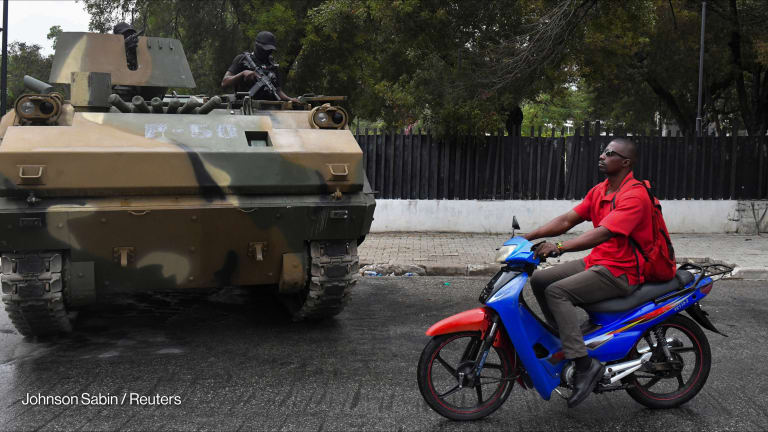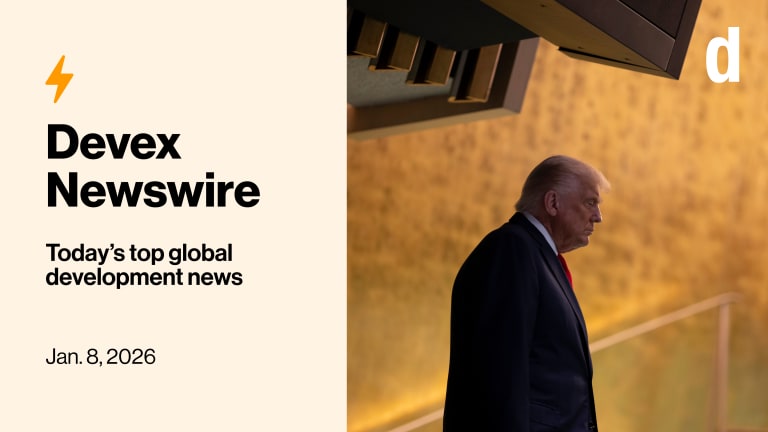Tips on applying to the Conflict, Stability and Security Fund
The United Kingdom government's Conflict, Stability and Security Fund has opened a new round of bidding, with changes to procurement intended to attract a more diverse range of partners, including small contractors and NGOs. Join Devex for a webinar on March 21 to hear insider tips on the fund and how to apply.
LONDON — The 1.2 billion British pound ($1.68 billion) Conflict, Stability and Security Fund — the United Kingdom’s largest and newest cross-governmental fund, which focuses on fragile and conflict-affected countries — has opened a new round of bidding, saying it hopes to attract a diverse range of partners, including small contractors and NGOs. The CSSF launched in 2015 as part of the U.K.’s cross-government strategy, which aims to spend 30 percent of official development assistance through departments other than the Department for International Development by 2020. The fund is hosted by the Foreign & Commonwealth Office but reports to the National Security Council. Its budget is made up of roughly half ODA and half non-ODA funds. Between 2016 and 2017, CSSF was the biggest spender of ODA after DFID and is the 21st largest ODA fund in the world, according to the annual report. The fund supports a range of activities under the banner of security and stability, from supporting communities affected by extremism to clearing landmines so that communities can regenerate the land. This will be the third time the procurement framework has gone out for tender and FCO bosses say they have been working to introduce improvements, including multiyear approvals and extended contract lengths, in order to make CSSF funds more accessible to smaller suppliers. The new procurement framework is also now organized under a single lot, as opposed to multiple lots in past years, which should make it easier for suppliers to bid on multiple tenders. Organizations have until March 28 to register their interest online and complete a selection questionnaire. The deadline for submitting clarification questions about the process is midnight March 21. Devex is also hosting a webinar on March 21 with the head of the CSSF's procurement hub, Philip Lord, during which participants can find out more about the fund and how to apply, and ask questions. In the past, there have been complaints about short application timelines; confusion around how funding decisions are made; difficulty in accessing strategy documents and guidance; and the lack of access to CSSF leaders, many of whom are senior security officials. Would-be applicants have also asked questions about how National Security Council leadership of the CSSF works in practice — how is policy set, communicated, and enforced? Others want to know how an integrated cross-government approach looks on paper in terms of which White Hall contracting regulations and priorities are implemented. Persistent rumors of a possible FCO takeover of DFID, even if repeatedly denied, and fears that yet more ODA funds are being stripped from DFID’s portfolio, have added an extra layer of confusion. CSSF itself has been criticized for a lack of transparency: It was placed under review last year alongside two others funds managed by the NSC after a critical report from the National Audit Office, and a new review from the Independent Commission on Aid Impact focused solely on CSSF is due out any time. As a successful CSSF recipient, peace building organization International Alert has experienced some of its teething problems first hand. The NGO has received CSSF funding for a number of projects, including boosting women’s leadership as a means of countering extremism in northeast Nigeria, and addressing stigma toward women and children affected by Boko Haram, helping to reintegrate them into their families and communities. Debbie Ball, head of fundraising, referred to a “struggle to engage” with the decision-makers, saying that, “not only is there confusion about who is making the decisions, but we generally don’t have any kind of security clearance to access those people” who can be high-level ambassadors, she said. This makes it difficult to know “what might be coming through in the pipeline,” and also means civil society is unable to have a “big voice in terms of influencing program design,” she added. However, access to strategy documents and other papers had improved in recent months, she said. While the fund is technically open to any U.K. government department or agency working on conflict, instability, and insecurity abroad, in reality FCO is by far the largest user of ODA funds from CSSF, accounting for more than 70 percent in the last round. The bulk of the remainder is spent by DFID, the Ministry of Defence, the Home Office, the National Crime Agency and the Crown Prosecution Service. Now in its third year, CSSF has “done what it said on the tin … It has brought government departments together to use these funds to work on conflict, stability, and security,” and it has “also supported niche, high-risk activity which is complementary to what departments do,” according to Melinda Simmons, director of Whitehall Funds at the National Security Secretariat, who was speaking during the recent Bond conference in London. However, Simmons also acknowledged there had been early challenges in rolling out the fund, which had made it difficult for smaller NGOs and contractors to bid. CSSF wants to attract more of these organizations, Simmons explained during the Bond session, recognizing they have comparative advantages when it comes to reaching local communities; initiating new approaches to conflict resolution; increasing peace-building work and expertise; ensuring lessons learned are shared across international donors; and building a diverse approach to monitoring and evaluation within the fund. Join Devex and Philip Lord, head of the procurement hub for the CSSF, for a webinar on applying to the new framework, March 21; and learn more about CSSF programming with Devex’s interactive visualization of its 2017-18 budget information.
LONDON — The 1.2 billion British pound ($1.68 billion) Conflict, Stability and Security Fund — the United Kingdom’s largest and newest cross-governmental fund, which focuses on fragile and conflict-affected countries — has opened a new round of bidding, saying it hopes to attract a diverse range of partners, including small contractors and NGOs.
The CSSF launched in 2015 as part of the U.K.’s cross-government strategy, which aims to spend 30 percent of official development assistance through departments other than the Department for International Development by 2020. The fund is hosted by the Foreign & Commonwealth Office but reports to the National Security Council. Its budget is made up of roughly half ODA and half non-ODA funds.
Between 2016 and 2017, CSSF was the biggest spender of ODA after DFID and is the 21st largest ODA fund in the world, according to the annual report. The fund supports a range of activities under the banner of security and stability, from supporting communities affected by extremism to clearing landmines so that communities can regenerate the land.
This story is forDevex Promembers
Unlock this story now with a 15-day free trial of Devex Pro.
With a Devex Pro subscription you'll get access to deeper analysis and exclusive insights from our reporters and analysts.
Start my free trialRequest a group subscription Printing articles to share with others is a breach of our terms and conditions and copyright policy. Please use the sharing options on the left side of the article. Devex Pro members may share up to 10 articles per month using the Pro share tool ( ).
Sophie Edwards is a Devex Contributing Reporter covering global education, water and sanitation, and innovative financing, along with other topics. She has previously worked for NGOs, and the World Bank, and spent a number of years as a journalist for a regional newspaper in the U.K. She has a master's degree from the Institute of Development Studies and a bachelor's from Cambridge University.








